The Microsoft Lumia 640 Review
by Brandon Chester on June 9, 2015 8:00 AM EST- Posted in
- Smartphones
- Microsoft
- Mobile
- Lumia
- windows phone 8
System Performance
Since the state of benchmarking on Windows Phone is not as mature as Android, I haven’t been able to compare the Lumia 640 to the competition in every aspect that I would like to. What I have been able to do is put it through our standard browser benchmarks, along with BaseMark OS II to look at individual component performance, and GFXBench to examine GPU performance.
While the absolute performance of Snapdragon 400 is well known, certain aspects of performance are heavily impacted by a device’s software. A good example is browser performance, which is a function of both SoC power and the speed of a device’s browser and Javascript engine. Two devices with the same SoC can have very different browser performance.
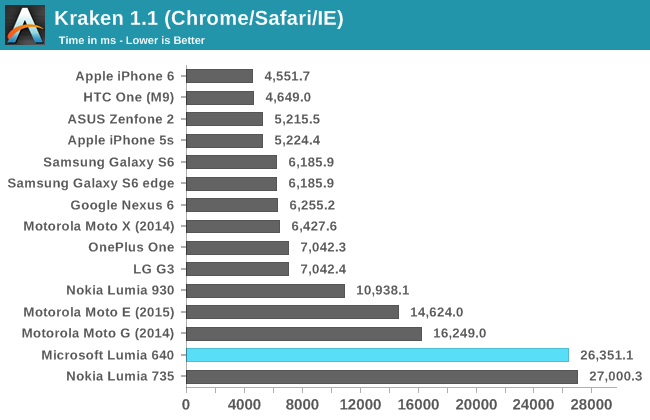

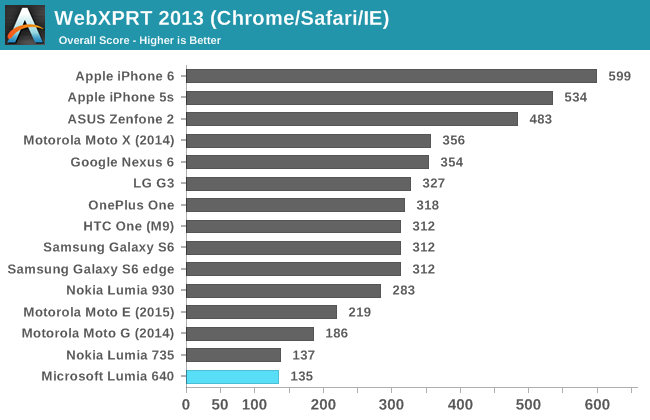
Unfortunately, it’s clear that Internet Explorer doesn’t measure up to Chrome and Safari when it comes to performance. While buyers may be pleased that their Lumia 640 performs as well as the more expensive Lumia 735, both of these phones occupy the lowest positions on every chart. There’s even a significant gap between them and other Snapdragon 400 devices running Android, such as Motorola’s Moto G.
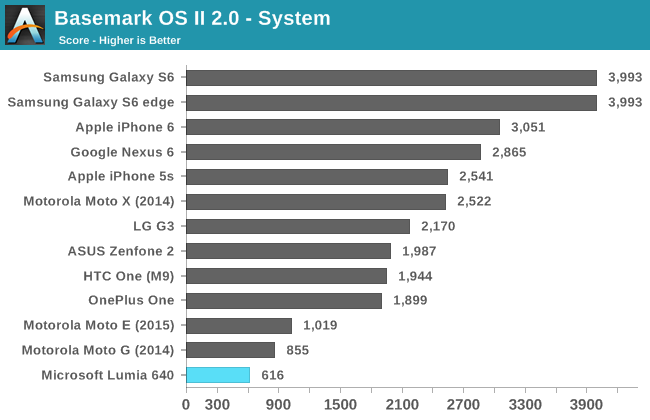
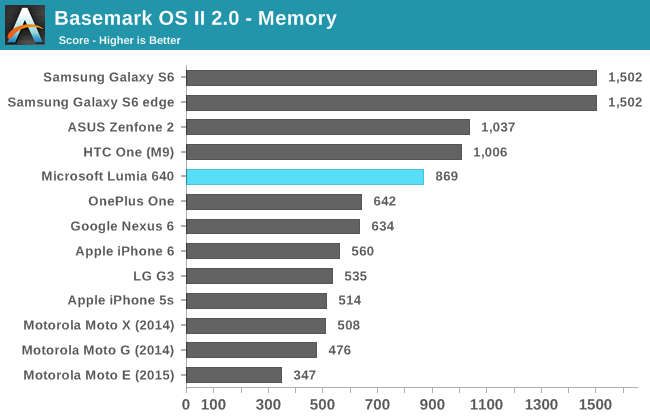
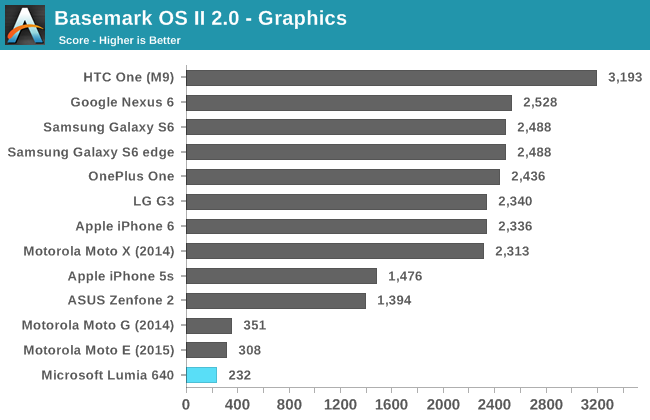
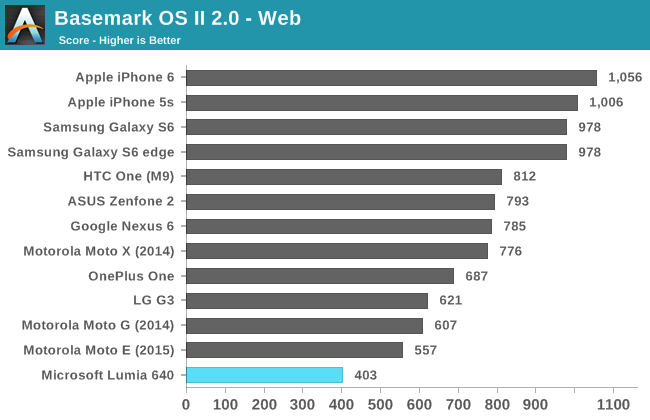
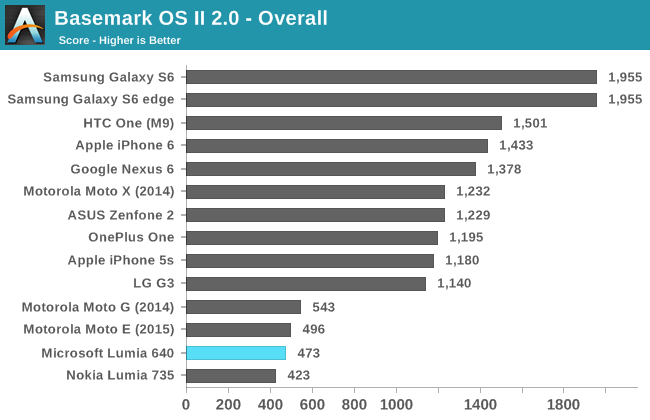
There's not much need to go into detail on the Lumia 640's performance in BaseMark OS II. With the exception of a fairly good result in the NAND memory test, the Lumia 640 achieves the lowest scores that we've seen in recent times.
Unfortunately, the Lumia 640 isn't shaping up to be a very quick device. It's consistently bested by Snapdragon 400 devices running Android, and in 2015 we're going to see Snapdragon 410 used as the SoC of choice in devices at this price bracket, which won't make the Lumia 640's position any better. Microsoft needs to iterate much quicker than they currently are. Their slow pace in adoption new hardware helped kill Windows Phone in the high end market, and it will do the same to the low end. I have some further words about performance on the Lumia 640 and Windows Phone in general, but those will have to wait until the software section of the review.
GPU Performance
The last area of performance to investigate is GPU performance. The performance of Adreno 305 has been thoroughly evaluated on Android, but differences in drivers and graphics APIs can improve or reduce performance across different operating systems.
Since Adreno 305 doesn’t support Direct3D feature level 10.0 and Shader Model 4.0 it’s unable to run the GFXBench 3.0 Manhattan test. This leaves us with only the T-Rex HD benchmark which isn’t very hard on high end devices, but still poses quite a challenge for weaker mobile GPUs.
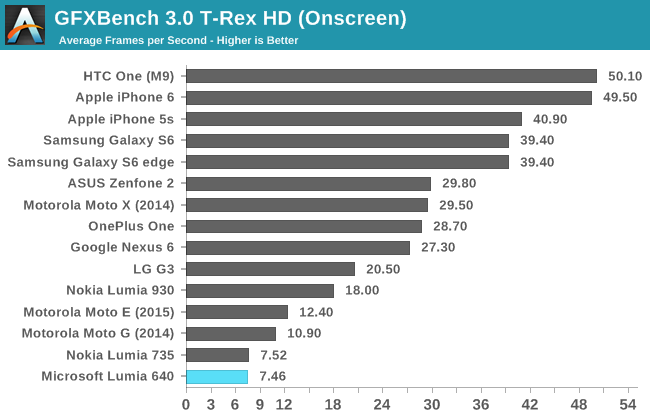
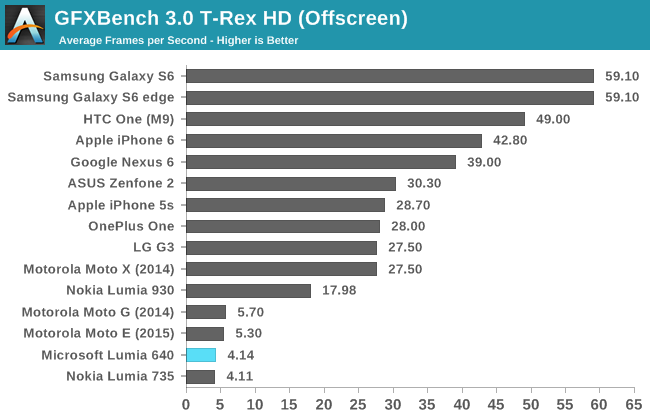
In both the on-screen and off-screen tests, the Lumia 640 lags behind the Moto G. While 1-2fps doesn’t seem like much, when your frame rate is in the low single digits it represents a significant difference in performance. Because of this, I decided to take a look at the performance in GFXBench’s driver overhead test to see what impact the GPU drivers and graphics API might have on performance.
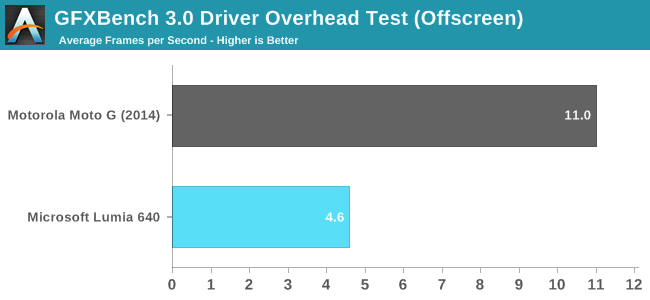
As suspected, there’s a very significant gap in performance when comparing the Lumia 640 to the Moto G. I can’t say whether this is due more to the differences between OpenGL and DirectX, or between the different Adreno drivers on Windows Phone and Android, but whatever the case may be the end result is a notable decrease in GPU performance on Windows Phone when compared to an Android device with the same SoC.
I’m not happy at all with the GPU performance that we see in low-end and even mid-range smartphones, and the Lumia 640 is no exception. There’s not much Microsoft can do here though, as moving to Snapdragon 410 with its Adreno 306 will not improve GPU performance at all. All I can really say is that users shouldn’t expect to be playing any 3D games on their Lumia 640, but simpler 2D games should run just fine.










130 Comments
View All Comments
anomalydesign - Tuesday, June 9, 2015 - link
I agree with pretty much all of the assessment of the Windows phone ecosystem in this article. Aside from users looking for a low end smartphone, there is one other group I consistently recommend windows phones for; first time smart phone users, especially those who are technology averse.I've found the Windows phone interface is the easiest to pick up and start using with minimal foreknowledge. Beyond that, it requires the least maintenance over the long run (android trends to get bogged down/buggy if you don't stay on top of it, plus between Google, the manufacturer and the carrier, users end up with things like 3 different apps for looking at photos, or using Facebook. ios is more polished and consistent, but has a lot of Apple ecosystem "features" which deeply confuse people who don't already have (or understand) feature of Apple accounts like the iCloud or iTunes. The backup features especially seem to confuse people.
The lack of apps and Google services is a problem, but less so when you consider the phone for a group that is behind the curve. If someone is more active on pinterest, hangouts, etc, then a different phone would work better. But for the group I recommend this phone for, if they do have any accounts set up, they tend to be with Skype or Hotmail, either of which is all you need to get the phone going. This group is also likely to appreciate things like a decent camera and good build quality much more than gpu performance.
That's not a good market for Windows Mobile long-term, as first time smartphone users are a dwindling segment. But as of now, I'm very glad to be able to suggest out as an option.
Daniel Egger - Tuesday, June 9, 2015 - link
And I disagree. While the ecosystem really is not that good there's one *huge* advantage to WP 8.1 which is often forgotten: it provides exquisite worldwide offline navigation, public transport information and a number of high quality applications out-of-the-box and there's no crapware which cannot be uninstalled unlike on Android devices.For me the absence of the Google spyware is actually a big plus instead of a negative especially since it is close to impossible to run an Android device without Play Store. Also in favour for WP is the fact that business necessities (mail, calendar, notes, contacts) work much better out of the box than on Android, not quite as good as on iOS but for a fraction of the price; it's actually quite amazing which hoops one has to hop through to get CalDAV and CardDAV running (with DAVdroid and CAdroid) only to be greeted all the time with the warning that someone might be spying on you while at the same time Google is leeching personal information and sending it to its own servers...
pSupaNova - Tuesday, June 9, 2015 - link
"For me the absence of the Google spyware is actually a big plus instead of a negative especially since it is close to impossible to run an Android device without Play Store"Google Spyware the Intelligent ware that help you to collate information, plan journeys and make your life much easier.
Microsoft lost in the smartphone arena because their offering was too late and that tile interface to alien for users and the fact that they locked down their OS.
If you notice smartphone's are starting to be digital assistants to excel at this function they will have to know information about you, my bet is that users will trade 'spyware' privacy for the benefits ever increasing A.I (smarts) brings to them.
Daniel Egger - Tuesday, June 9, 2015 - link
"Google Spyware the Intelligent ware that help you to collate information, plan journeys and make your life much easier."Right. I have not found a single thing in Google that made my life easier compared to alternate offerings, privacy issues not even considered. For instance when it comes to journeys WP provides a much better service especially when taking the offline mode into account; Here Maps (WP only version) is quick and constantly updated and already has plenty of POIs built it plus it is very useful to pin tiles with important destinations for quick access to important destinations, Drive has outstanding routing capabilities, accurate traffic information (when online) and a very useful energy saving and driver friendly mode, Transit (and public transport planning in the other apps) works astonishingly well all around the globe and provides accurate pedestrian/public transport planning (especially when online it will also have and use current departure times to provide the best alternatives), City Lens is extremly useful to find nice places around you.
"If you notice smartphone's are starting to be digital assistants to excel at this function they will have to know information about you,"
B.S. I've used smartphones back in the times when the term smartphone wasn't even coined (they were called PDAs back then). The most important point is good synching capabilities (Android only syncs well with Googles' own services which are pretty much useless for professional and/or privacy concerned use) followed by applications with outstanding usability and both leave a lot to be desired out-of-the-box in Android -- funny enough the replacement application which Asus ships with their devices have much better usability than the Google built-ins.
pSupaNova - Tuesday, June 9, 2015 - link
Google's services offer a seamless fit across device types I like that I can order to go out for dinner on the desktop and get my calendar updated on my phone. That I Google Now knows my habits and will tell me if their are problems getting home from work.Your trying to make out as Nokia Maps is a killer feature which you can download on Android if you wanted anyway.
The advantages of Live traffic updates far out way using a Sat Nav on offline mode we our living in a ever connected world get with the program.
Android is the Windows of the smartphone world. Its more open has lots of hardware, highly configurable in both hardware and software.
" funny enough the replacement application which Asus ships with their devices have much better usability than the Google built-ins." - yes Google Android platform allows others to innovate.....
Daniel Egger - Tuesday, June 9, 2015 - link
"Google's services offer a seamless fit across device types I like that I can order to go out for dinner on the desktop and get my calendar updated on my phone."Yes, that's called syncing. And Android devices are horrible syncers when services other than Google should (or need to) be used. That's a clear no-go for corporate and privacy concerned uses.
"Your trying to make out as Nokia Maps is a killer feature which you can download on Android if you wanted anyway."
No you can't. Here Maps on Android and iOS is a incomplete and halfassed solution requiring sign-up.
"The advantages of Live traffic updates far out way using a Sat Nav on offline mode we our living in a ever connected world get with the program."
No, it doesn't. Here Maps has exceptionally good live traffic updates when online. But you're obviously not coming around a lot if you don't see a problem streaming maps around the globe. Roaming charges can be horrific...
"Android is the Windows of the smartphone world. Its more open has lots of hardware, highly configurable in both hardware and software."
Again B.S., there're very few Android devices which work nicely out-of-the-box. Most of the devices are bloatware ridden and thus provide an inferior experience and abysmal battery life and often they're already dead right from the factory as they'll rarely see any updates which is a must due to the terrifying amount of security problems. There're only few exceptions mostly provided by Google itself and manufacturers for Google like Motorola, Samsung and Asus; but thanks to Intel even the custom rom approach is somewhat thwarted in certain price regions...
I've yet to see an Android device providing an enjoyable experience and acceptable battery life without wasting much time with tinkering. My Moto E (2nd gen) became pretty much usable after installing an unofficial CM12.1 ROM and freezing of all Google services -- over 9 days of battery life are more than okay nowadays, previously with (almost stock Android) Motorola software (both Kitkat and Lollipop) the battery was dead after no more than 2,5 days.
I do have plenty of other Android devices at my disposal if you need more input.
WP devices on the other hand do not require any tinkering and yet offer a much better general experience and battery life as well as nice apps without paying through your nose with your personal data.
iPhones do, too, however those are obscenely expensive compared to WP phones without providing any massive benefits worth the markup.
pSupaNova - Wednesday, June 10, 2015 - link
I have an Sony Xperia Z3 Compact & the battery life and out of the box experience are brilliant.I have not had to install a Custom Rom for years, that's for people with too much time on their hands.
if you want dumb phone battery life then why are you buying a Smartphone?
Windows Phone is so trash that you can't even browse the files on the system when you plug it into your PC.
With windows phone its hard to get it talking with your smart TV or NAS.
File Managers are also a joke. I tried windows phone 7 and saw how Microsoft thought they could lock you down like Apple and knew instantly that they would lose to Android.
Android is fine at synching to other services I have use yahoo mail, EverNote & OneNote with no problems also I have my photos from my phone camera and whatsapp automatically sync with both Amazon & Google Photos so I never lose a photo, I think you are spreading lies.
Windows Phone will never catch up to Android because it's has not Got the developers or consumers mindshare and this is coming from some-one with over two decades of professional Windows Development experience.
Windows Tablets on the overhand do have a chance.
jakoh - Thursday, June 11, 2015 - link
WP7, lol, was terrible. Its like saying i hate android because of android 2.3 (which was still pretty popular a couple of years ago.BTW, there is a files app on WP8.
jakoh - Thursday, June 11, 2015 - link
If its worth anything "exquisite worldwide offline navigation" is now available on android and IOS, Here Maps.I like to mention that I would switch to Android, if I can select the apps that run in the background (please dont offer killing apps). Also Google on Tap should be offered as something parents would get to put on their childrens phone.
Alexvrb - Tuesday, June 9, 2015 - link
If you lock yourself into somethng that is platform-limited like Hangouts or even worse iStuff that's not MS' fault. Skype and FB Messenger for example run on just about everything. Same with Kindle, Dropbox, most MS services, etc. I tend to avoid services that don't have broad platform support. It's just retarded to say "Oh I can't buy or recommend that phone because I let myself become dependent on some proprietary lockware".